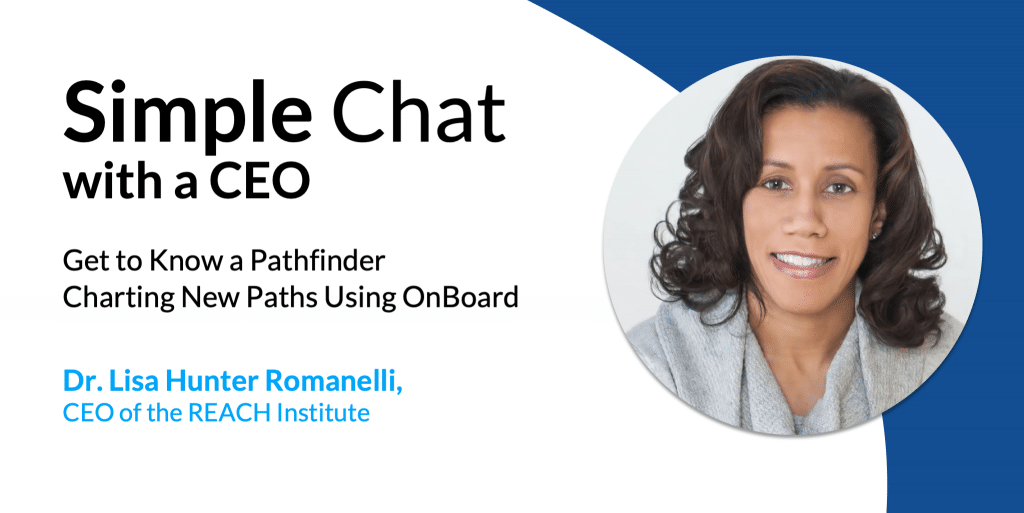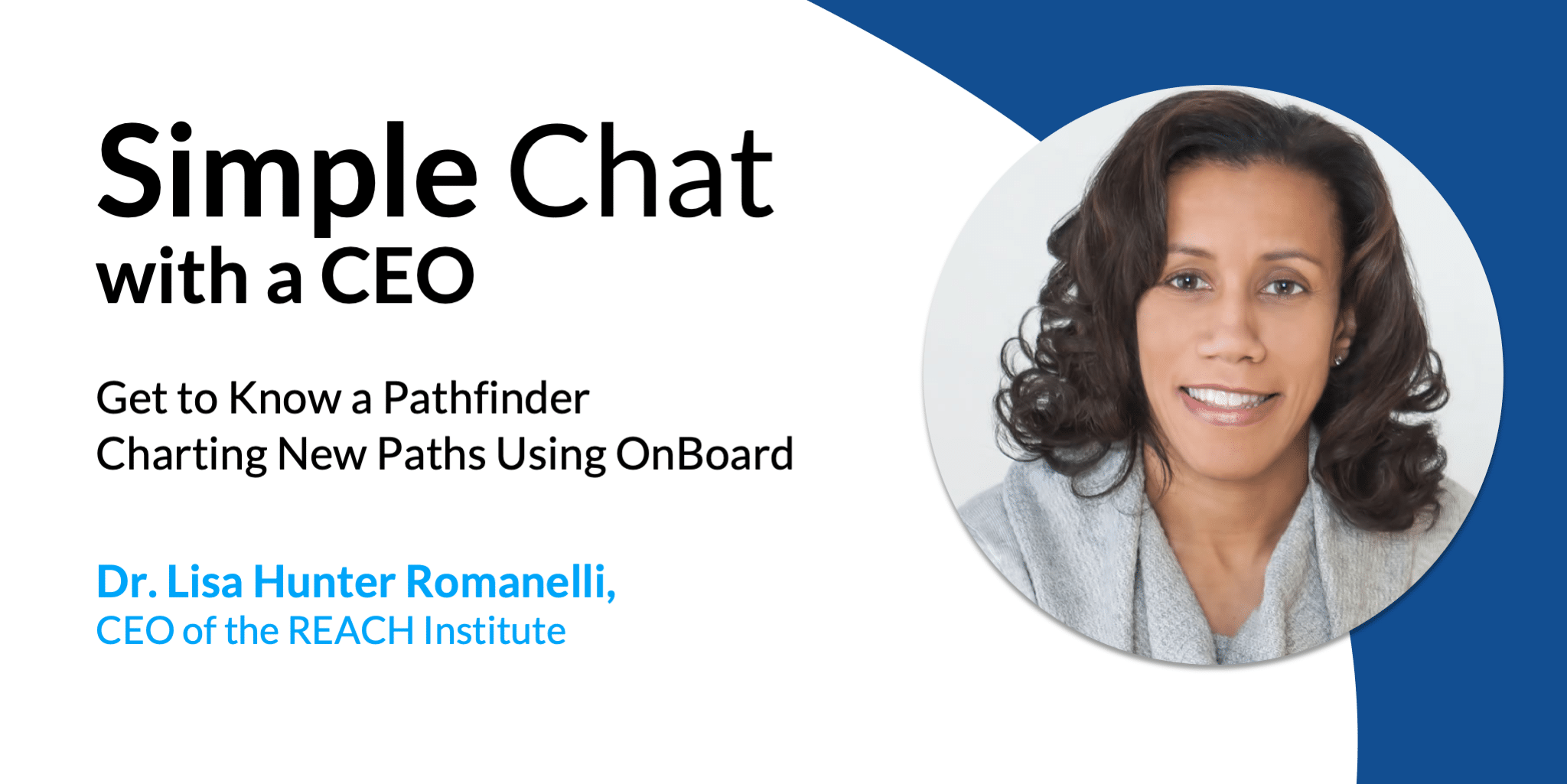About “Simple Chat with a CEO”
By definition, a Pathfinder is “one that discovers a way, especially one that explores untraversed regions to mark out a new route.” At Passageways, every employee is called a Pathfinder. So, too, are our customers.
In this new content series, we’ve asked some amazing OnBoard customers to sit down for a simple chat. The names and places may differ, but they all have one thing in common: they are all charting new pathways forward for their organizations.
We are proud to highlight Dr. Lisa Hunter Romanelli, the CEO of the REACH Institute.
Getting to Know Your Work
1. In 2012, the actor Alan Alda created the Flame Challenge, which asks scientists to answer a technical question in a clear and entertaining way to an audience of 11-year-olds. In the spirit of the Flame Challenge, could you describe childhood mental health care in a way a child could understand.
Childhood mental health care helps kids solve problems related to how they are thinking, feeling, or acting. We all have feelings. Some of those feelings are pleasant – like happiness, excitement, and pride (for doing something that’s really great) – and some of those feelings are unpleasant feelings like sadness or worry. A lot of times, kids are able to either deal with an unpleasant feeling because it doesn’t last too long or figure out a way to solve the problem that is causing the feeling. But sometimes, kids get stuck in an unpleasant feeling. This means they have difficulty figuring out how to think or act in ways that will help them feel better and the unpleasant feeling gets in the way of them doing things that they have to do or like to do. Mental health treatment can help kids when they get stuck in those unpleasant feelings by teaching them how to cope with the feelings, change their thinking, change their behavior, and solve problems so that they can do the things that they need to and like to do.
2. What’s the biggest misconception people have about children’s mental health?
One common misconception is that children will “grow out” of a mental health condition. The truth is that when a child has a mental health condition, they can’t just grow out of it without getting help. Left untreated, a mental health condition in a child usually leads to greater impairment. Over time, an untreated mental health condition becomes more difficult to treat. When parents or teachers have a concern about a child’s mental health, it’s really important they have the child assessed by a qualified professional to determine if the concern is something that requires treatment.
Mental Illness is not a choice. Via @gmfdesigns #Endthestigma #REACH4kids #childrensmentalhealth pic.twitter.com/LFb2mg4wSA
— The REACH Institute (@reach4kids) October 29, 2019
3. Complete this sentence: “The REACH Institute is amazing because ______.”
The REACH Institute is amazing because we are improving the lives of children by empowering their providers to know and use mental health treatments that work.
4. Complete this sentence: “The REACH Institute’s Board of Directors is amazing because ____.”
The REACH Institute’s Board of Directors is amazing because our board members regularly demonstrate their commitment to REACH’s mission by sharing their expertise so we can improve the work that we do, helping to raise funds to support our work, and just being really enthusiastic about REACH. We are very lucky to have a great board!
Getting to Know How You Work with Your Board
5. What are 3 traits that successful Board members demonstrate?
One of the primary traits is enthusiasm for the mission of the organization. That’s really key. Another important trait is effort. And by that, I mean a willingness to really get involved in the work of the board and to roll up their sleeves and help when help is needed. The last trait is commitment – committing time, effort, and expertise to the work of the organization.
6. What is one thing a Board can do immediately to become more effective in its approach to solving problems?
One thing that could be particularly helpful is to use data specifically related to the mission of the organization to inform problem-solving. All organizations collect some type of data such as evaluation data for programs that are offered or testimonials from people that are served by the organization. I think boards can spend more time looking at that data in collaboration with the staff to make sure that the organization is really delivering on its mission. And if it’s not, that data can be used to help figure out what might be getting in the way of the organization delivering on its mission as optimally as possible.
7. What originally motivated the REACH Institute to look at a board management software?
We have an annual retreat for the board. Last year at the retreat, the members of the board’s development committee were talking about how it had been challenging to share information with new board members and really get them acclimated to the organization as quickly as possible. That conversation led to the idea of investigating board management software as a way of having one centralized place where board members could have easy access to information about the organization and their roles and responsibilities as board members.That’s where the idea to subscribe to Onboard came from. We really wanted to look at a way of utilizing technology and minimizing our past reliance on paper and email as a way to communicate with board members.
8. Nietzsche said, “That which will not kill you will make you strong.” How has Passageways OnBoard helped make REACH Institute’s Board stronger and more entrepreneurial?
Again, one of our reasons for using OnBoard was to streamline our communications and keep everybody informed. Since we’ve been using Onboard, the board is stronger because they all have easy access to the same information. They’re able to get information about the organization and things that we’re doing on their own without having to rely exclusively on staff to get them a particular document. [OnBoard has] given them a little more autonomy, their own place where they can communicate with each other, and get the necessary information to be able to fulfill their role.
9. Looking forward to the future, how do you see Passageways OnBoard continuing to help REACH Institute’s Board fulfill its mission to serve children and their families?
As board members continue to get comfortable with using it and staff are better at uploading relevant documents to the platform, it will just help the organization be more efficient in communicating and sharing information. And that will help us with our mission.

Getting to Know You
10. With thanks to James Lipton and “Inside the Actor’s Studio,” what’s your favorite word?
My favorite word these days is opaque. The story behind that is that over the summer, my daughter was reading and came to me to ask, “What is ‘oh paca queue’ mean? And I had no idea what she was talking about! So she showed me the word, and I said, “Oh! You mean opaque!” Since then, whenever I hear the word opaque, I think “oh paca queue” and a big smile comes to my face.
11. Who or what did you have posters of on your bedroom wall as a teenager?
Art posters. I was very into art as a teenager. Whenever I went to a museum, I would buy art posters at the museum gift shop. I had a lot of Monet posters on my wall and some Van Gogh. Not the typical wall decor for a teenager, but that’s what I had. Art posters.
12. What was your first job?
My first job was as a camp counselor at a day camp in my town for five-year-olds. I did that at my first job all the way through to my first summer of college. It definitely informed my work. I really enjoy kids and hanging out with them in the summers, so it was a lot of fun.
13. If you could snap your fingers and become an expert in something, what would it be?
I would become an expert pastry chef. I have a major sweet tooth! I like my desserts and I would love to become more expert in baking.
14. What piece of art – book, movie, music, artwork, etc. – moved you the most and why?
A few summers ago, we went to Italy on a family vacation. I was lucky to see Michelangelo’s Pieta at St. Peter’s Basilica, a marble sculpture of Mary holding her son, Jesus, that depicts a mother’s love for her child. As a mom of three kids, it really spoke to me.
15. What’s the best piece of advice you have ever been given?
Both my parents really emphasized education to me and my siblings. My mom would often say this poem to me: “Learn, learn until you are old for learning is better than silver or gold. Silver and gold will vanish away, but good education will never decay.” I’m not sure where the poem came from, but it was very good advice that I took to heart.
16. If you could know the absolute and total truth to one question, what question would you ask?
Is Santa Claus real?
Now, for the $10 million bonus question: if a donor came to you today with $10 million to use with no conditions or restrictions, what would your first priority be?
Wow! Getting an unrestricted donation of that size would be a dream come true for REACH.
REACH does a lot of training of people who touch the lives of kids in different ways. One of our biggest training programs coaches pediatricians on how to help children with mental health concerns. Pediatricians are often the first line of intervention with kids, and parents typically go to their pediatrician if they have a mental health concern about their child. However, the average pediatrician does not get much mental health training. In 12 years, REACH has trained over 3,500 pediatricians. That’s great, but there are approximately 58,000 pediatricians in the United States. So, we’ve got a long way to go. With $10 million, my first priority would be to focus on ways to increase the number of pediatricians, particularly those serving poor children, that are able to access our training.
About Lisa Hunter Romanelli, Ph.D.
Lisa Hunter Romanelli, Ph.D. is the CEO of the REACH Institute. She is a clinical child psychologist with expertise in cognitive behavioral therapy. Dr. Hunter Romanelli came to REACH from the Columbia University College of Physicians and Surgeons, where she was an Assistant Professor of Clinical Psychology in Psychiatry and Director of School-Based Mental Health Programs at the Center for the Advancement of Children’s Mental Health. She has extensive experience in the implementation of evidence-based mental health practices, school-based mental health, and the supervision of clinical psychology interns. She graduated cum laude from Harvard University (where she majored in psychology), earned her Ph.D. from Rutgers University, and completed her internship and post-doctoral fellowship at the Yale Child Study Center.
About the REACH Institute
The REACH Institute’s mission is to ensure that the most effective, scientifically-proven mental health care reaches all children and families. The organization partners with leaders in primary care and mental health to deliver interactive training and consultation programs to primary care providers, behavioral health care providers, teachers, and parent advocates. For more information, we encourage you to visit their website at https://www.thereachinstitute.org.
About The Author

- At OnBoard, we believe board meetings should be informed, effective, and uncomplicated. That’s why we give boards and leadership teams an elegant solution that simplifies governance. With customers in higher education, nonprofit, health care systems, government, and corporate enterprise business, OnBoard is the leading board management provider.
Latest entries
 Board Management SoftwareJuly 26, 20225 Critical Board Engagement Survey Questions
Board Management SoftwareJuly 26, 20225 Critical Board Engagement Survey Questions Board Management SoftwareJuly 19, 2022What is an Advisory Council? (Overview, Roles, and Responsibilities)
Board Management SoftwareJuly 19, 2022What is an Advisory Council? (Overview, Roles, and Responsibilities) Board Management SoftwareJuly 15, 2022Balance Sheet vs. Income Statement: What’s the Difference?
Board Management SoftwareJuly 15, 2022Balance Sheet vs. Income Statement: What’s the Difference? Board Management SoftwareJuly 12, 2022Sweat Equity: Mark Haas of the Dallas Cup Board Gives a Nonprofit Play-by-Play for Success
Board Management SoftwareJuly 12, 2022Sweat Equity: Mark Haas of the Dallas Cup Board Gives a Nonprofit Play-by-Play for Success


